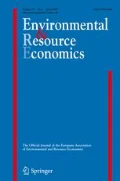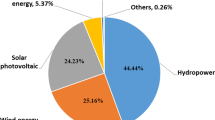Abstract
This paper evaluates, from the ethical viewpoint, current work by economists on intergenerational resource allocation in the presence of global warming. We begin by attempting to elucidate the debate that has recently occurred on the appropriate choice of the discount rate. We offer three justifications for maximizing the discounted sum of generational utilities, and find only one of these to be a satisfactory justification of that practice: the possibility that the human species may become extinct. This implies that a very small discount rate (large discount factor) should be used. We argue that the justification for discounting, inherent in the approaches taken by many economists, is that of ‘the present generation of hegemon,’ which is unacceptable. The role of the Ramsey equation in deducing the discount rate in these theories is explained. As an alternative to discounted utilitarianism, we propose a principle of sustainability; we describe optimal paths that have been calculated for the sustainabilitiarian (Rawlsian) objective function, and paths that will sustain growth in welfare, at a positive rate. We report results concerning optimal paths when the uncertainty of existence of future generations is taken into account. In sharp contrast to the utilitarian model, it turns out that under some conditions, the ‘sustainabilitarian’ can ignore the uncertainty regarding the date at which humans become extinct. There is a striking difference between the solutions of the discounted utilitarian program and the sustainabilitarian program under uncertainty.
Similar content being viewed by others
References
Arrow K (1973) Rawls’s principle of just savings. Swedish J Econ 75: 323–335
Asheim G, Buchholz W, Tungodden B (2001) Justifying sustainability. J Environ Econ Manag 41: 252–268
Asheim G, Tungodden B (2004) Resolving distributional conflicts between generations. Econ Theory 24: 221–230
Basu K, Mitra T (2003) Aggregating infinite utility streams with intergenerational equity: the impossibility of being Paretian. Econometrica 71: 1557–1563
Basu K, Mitra T (2007) Utilitarianism for infinite utility streams: a new welfare criterion and its axiomatic characterization. J Econ Theory 133: 350–373
Buchholz W (1997) Intergenerational equity. In: Zylicz T (ed) Ecological economics. Uppsala University Press, Uppsala
Dasgupta P (1974) On some alternative criteria for justice between generations. J Public Econ 3: 415–423
Dasgupta P (2005) Three conceptions of intergenerational justice. In: Lillehammer H, Mellor DH (eds) Ramsey’s legacy. Clarendon Press, Oxford
Dasgupta P (2008) Discounting climate change. J Risk Uncertain 37: 141–169
Diamond P (1965) The evaluation of infinite utility streams. Econometrica 33: 170–177
Intergovernmental Panel on Climate Change: (2008) Climate change 2007: the physical science basis. Cambridge University Press, Cambridge
Koopmans T (1960) Stationary ordinal utility and impatience. Econometrica 28: 287–309
Llavador H, Roemer J, Silvestre J (2008) [LRSa] A dynamic analysis of human welfare in a warming planet. http://pantheon.yale.edu/~jer39/climatechange.html
Llavador, H, Roemer J, Silvestre J (in press) [LRSb] intergenerational justice when the existence of future generations is uncertain. J Math Econ
Matthews HD, Caldeira K (2008) Stabilizing climate requires near-zero emissions. Geophys Res Lett 35: L04705. doi:10.1029/2007GL032388
Neumayer E (2003) Weak versus strong sustainability: exploring the limits of two opposing paradigms. Elgar, Cheltenham
Nordhaus W (2008) A question of balance. Yale University Press, New Haven
Nordhaus W (2007) A review of the stern review on the economics of climate change. J Econ Lit 45: 686–702
Ramsey F (1928) A mathematical theory of saving. Econ J 38: 543–559
Roemer J (1996) Theories of distributive justice. Harvard University Press, Cambridge
Roemer, J, Suzumura, K (eds) (2007) Intergenerational equity and sustainability. Macmillan, London
Silvestre J (2002) Progress and conservation under Rawls’ maximin principle. Soc Choice Welfare 19: 1–27
Solow R (1974) Intergenerational equity and exhaustible resources. Rev Econ Stud (Symposium) 3–28
Stern N (2007) The stern review on the economics of climate change. Cambridge University Press, Cambridge
Stern N (2008) The economics of climate change. Am Econ Rev Pap Proc 98: 21–37
Weitzman M (2007) A review of the stern review on the economics of climate change. J Econ Lit 45: 703–724
Weitzman M (2008) On modeling and interpreting the economics of catastrophic climate change. Rev Econ Stat (forthcoming)
Withagen C, Asheim G (1998) Characterizing sustainability: the converse of Hartwick’s rule. J Econ Dyn Control 23: 159–165
Author information
Authors and Affiliations
Corresponding author
Additional information
Many of the ideas presented here, and all of the formal results, come from a collaboration with Joaquim Silvestre and Humberto Llavador on the problem of intergenerational welfare in a warming planet. The paper reports some of the conclusions from our joint work, referenced below. I thank Geir Asheim, Klaus Nehring, Olof Johansson-Stenman and a referee for their suggestions.
Rights and permissions
About this article
Cite this article
Roemer, J.E. The Ethics of Intertemporal Distribution in a Warming Planet. Environ Resource Econ 48, 363–390 (2011). https://doi.org/10.1007/s10640-010-9414-1
Accepted:
Published:
Issue Date:
DOI: https://doi.org/10.1007/s10640-010-9414-1
Keywords
- Climate change
- Global warming
- Intertemporal optimization
- Social discount rate
- Discounted utilitarianism
- Rawlsian justice
- Sustainability




